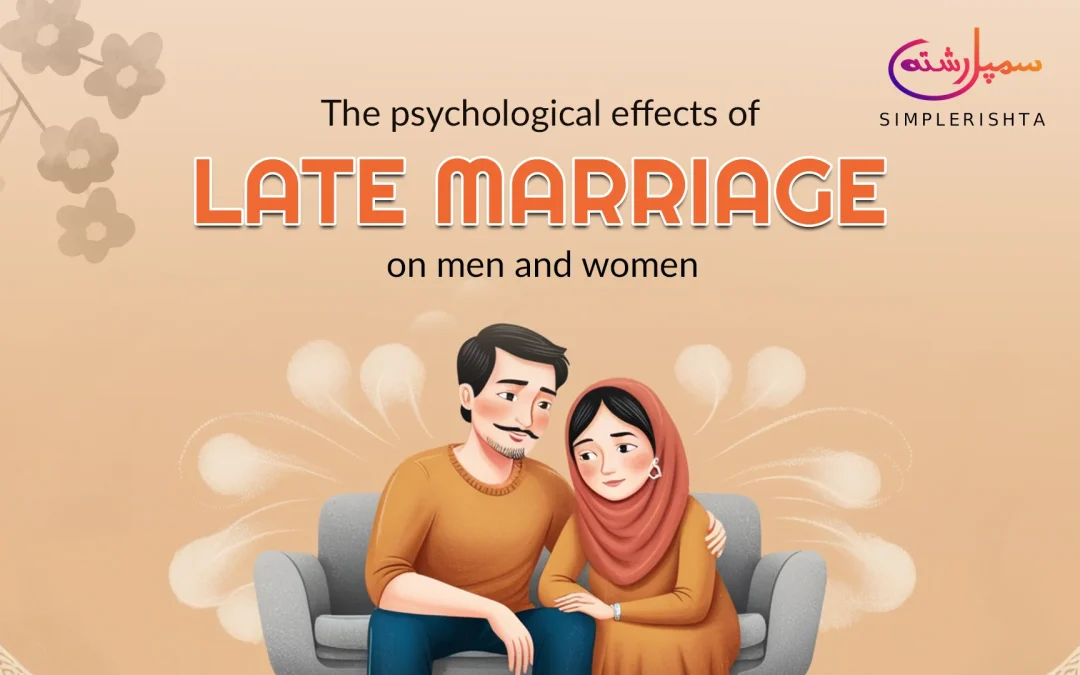So, you’re someone who’s taking your time with marriage—maybe you’re focused on your career, enjoying your independence, or just haven’t met “the one” yet. And guess what? You’re not alone. Late marriage is no longer a new topic; it’s becoming increasingly common. While marrying early was once the norm, times have changed, and the old stereotypes are fading away. However, it’s important to consider the Psychological Effects of Late Marriage, as it brings both unique challenges and opportunities for personal growth.
Marriage is a significant milestone in many cultures. However, with changing lifestyles, education, and career goals, late marriages have become increasingly common. While societal perspectives focus on cultural norms, the psychological effects of late marriage on both men and women deserve more attention.
Why Late Marriages Are on the Rise?
- Many people today prioritize their education and careers. Building a strong foundation in these areas often takes time and dedication, which can naturally delay marriage.
- A lot of people feel more comfortable getting married when they’re financially stable. This allows them to provide for themselves and potentially a family without undue stress.
- There’s more acceptance of individual choices these days. People are free to explore their passions, travel, and live life on their own terms before committing to marriage.
- Finding someone you’re truly compatible with takes time and effort. Sometimes, societal expectations or unrealistic standards can make it harder to find that special someone.
The Psychological Effects of Late Marriage on Men
1. Loneliness and Social Isolation
As men delay marriage, they may find themselves socially isolated. In many societies, marriage is seen as a way to start a family and develop stronger community ties. So, late marriage can lead to loneliness, especially as friends and peers move on to new phases of life.
2. Emotional Stress and Pressure
Societal and familial pressure to settle down can be a major source of emotional stress for men. In cultures where early marriage is still the norm, unmarried men may be judged or questioned constantly. Thus, this pressure can lead to feelings of inadequacy or failure.
3. Fear of Commitment
The longer men delay marriage, the greater their hesitation about settling down. Over time, they may develop a fear of losing their independence or adjusting to someone else’s lifestyle, which can impact their relationships.
4. Pressure to Prove Themselves
Men may feel an unconscious need to demonstrate their masculinity and their ability to provide for a family, particularly if they marry someone younger. This pressure can intensify when friends or family members have already established successful and happy families, leading to comparisons and added stress.
5. Anxiety About Starting a Family
Late marriages often mean delayed parenthood. Men may worry about their biological age and their ability to care for children later in life. Concerns about generational gaps and their role as older fathers can add to their anxiety.
6. Fear of Emotional Weakness
Men who remain single for a long time might become emotionally reserved or distant. The idea of being vulnerable or sharing a life with a partner can seem daunting, leading to difficulties in forming meaningful emotional connections.
The Psychological Effects of Late Marriage on Women
1. Societal Judgment and Stigma
Women, especially in traditional societies, face greater societal pressure when they delay marriage. Labels like “leftover women” can hurt their self-esteem and make them feel rejected or unworthy.
2. The Biological Clock Tick-Tock
One of the most significant psychological effects of late marriage for women is anxiety surrounding their fertility. Women are often reminded of their biological clock, which creates pressure and stress about starting a family in time. The biological clock is a powerful force. For many women, the desire to have children can intensify with age, which leads them to anxiety and potential feelings of inadequacy. This can be especially pronounced if they encounter difficulties with fertility.
3. Finding Mr. Right
For women especially, the matchmaking pool can feel smaller as they get older. Additionally, if they are looking for a serious, long-term partner. This can lead to feelings of frustration and disappointment.
4. Career vs. Family
Balancing a successful career with the desire for a family can be a significant struggle. Many women face difficult choices between their professional ambitions and their aspirations for motherhood.
5. Pressure to Settle
One of the most significant psychological effects of late marriage on women is the pressure to settle for less-than-ideal partners. As age increases, societal expectations intensify, often leading to anxiety and desperation. Many women find themselves overwhelmed by questions from family and peers, such as “When will you settle down?” or “Why are you still single?” These external pressures can create a mental burden, making women feel that they are running out of time to find the “right” partner.
6. Impact on Mental Health
The stress from societal pressure, family expectations, and personal worries can affect mental health. Women may feel anxious, sad, or emotionally tired as they deal with late marriage problems. Feelings of not being good enough, fear of being judged, and loneliness can make these struggles even harder.
How to Mitigate the Psychological Effects of Late Marriage?
While late marriage can have psychological effects, it is possible to navigate these challenges positively:
- Accept that marriage is a personal choice, not a race. Focus on your growth, happiness, and readiness rather than societal expectations.
- Understand your own motivations for marriage, your relationship expectations, and any potential anxieties you may have.
- Surround yourself with supportive friends, family, or counselors who help you cope with societal pressures.
- Late marriage does not mean failure. Focus on redefining personal goals that include marriage as one part of a fulfilling life.
- Make time for yourself to de-stress and recharge. This could include exercise, hobbies, or simply spending time in nature.
- If you encounter judgment or pressure from others, gently but firmly address it. Remind yourself that your happiness matters most.
Perspectives on the Psychological Effects of Late Marriage
We asked a group of people about their experiences with marrying later in life, and here’s what they had to say:
Aisha, 32:
“As a doctor, I’ve often faced immense societal pressure to get married, especially from my family. In their eyes, I had already spent too much time pursuing my education and completing my house job. Now, as an educated and career-oriented woman, the pressure hasn’t eased—society still expects me to settle down quickly. The constant questions about marriage have become a recurring theme in conversations, and at times, it feels overwhelming, as if I’m racing against a ticking clock.
However, looking back, delaying marriage has been a blessing in disguise. It gave me the opportunity to focus on my medical career and invest in my personal growth. This time allowed me to become more confident and self-assured, giving me clarity about the qualities I truly value in a life partner.”
Ali, 33:
“For me, it wasn’t about delaying marriage, but about finding the right partner who understands the demands of my profession. As an army officer, frequent postings and moving from city to city are a way of life. I wanted someone who could adjust to this lifestyle or comfortably live with my family when I’m stationed in remote or challenging areas. I’ve seen colleagues rush into marriages, only to face struggles later because their partners couldn’t cope with the pressures of army life. Waiting to marry gave me the time to understand myself better and recognize the kind of partner I truly need. The societal pressure to settle down is real, but I’ve learned to tune it out and focus on deciding that’s right for me.”
Hina, 36:
“The biggest benefit of late marriage is knowing exactly what I’m getting into. By the time I marry, I experience life, understand my values, and develop a strong sense of self-awareness. However, the journey isn’t without challenges. As a lawyer, I constantly face societal pressure to marry quickly. Many people still dismiss law as an ideal career for women, and I often hear comments about how my demanding job makes it harder to ‘settle down.’
Balancing societal expectations with my career ambitions feels emotionally taxing at times, especially when concerns about starting a family come up. But I’m glad I take the time to focus on my growth and career. Marrying later ensures I know exactly what I want in a partner, and I feel confident in the choices I make for myself.”
Imran, 40:
“At first, I didn’t feel much pressure to marry. But as my younger siblings get married, I start to feel the weight of being the eldest, especially after my father passes away and I take on the responsibility for them. Once they settle down, I realize I’m no longer in the age bracket society typically expects for marriage. Despite this, I find that waiting gives me a sense of maturity and independence that I wouldn’t have gained if I married younger.”
The Bottom Line
The Psychological Effects of Late Marriage can be pretty complex. It affects both men and women in different ways, but also in some similar ways. While societal pressures and personal worries can make getting married later emotionally challenging, on the flip side, they can also bring valuable benefits. Such as greater maturity, independence, and a clearer understanding of what you truly want in life and a relationship.
Therefore, instead of stressing about what others expect, focus on your own readiness, emotional well-being, and building healthy relationships. Late marriage can be a wonderful experience, filled with love, joy, and companionship. So, whether you’re in favor of late marriage or just find yourself in a situation where you couldn’t marry earlier, stay positive and aware of the challenges that come with both early and late marriage. By understanding these challenges, you can take proactive steps to handle them and increase your chances of having a happy and fulfilling marriage, no matter your age.
Here are a few questions we’d like to ask:
- In your opinion, how does society impact decisions about marriage age?
- Have you experienced any challenges or benefits from marrying later in life?
- What steps do you think can help manage the psychological effects of late marriage?
We’d love to hear your thoughts! Share your experiences and perspectives in the comments below!
Disclaimer: This blog post is for informational purposes only and should not be considered professional psychological advice.



Great read! It’s eye-opening to see how late marriage can impact both men and women psychologically. Definitely makes you think about the different factors at play in life’s timing.
It’s important to understand how life experiences and timing can impact relationships. Great job!”